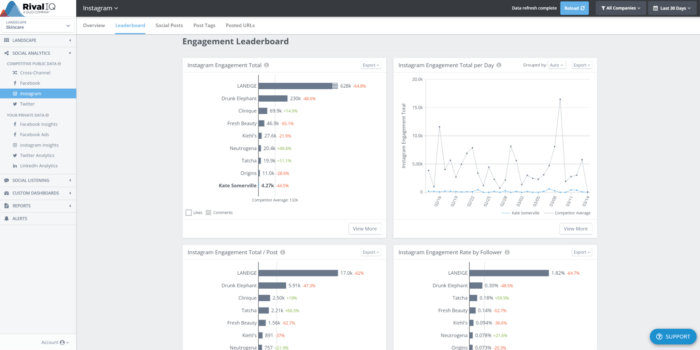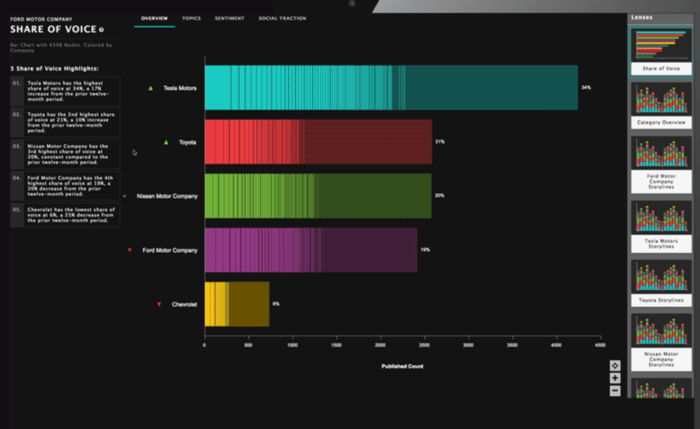When you were little, your teacher likely told you something like, “Keep your eyes on your own paper.” You likely learned not to look at what your academic rivals were doing, but the same sentiment doesn’t work in the marketing world. To keep up with your industry, it’s vital to keep an eye on your competitor’s “paper,” which is where competitor monitoring tools come in.
By monitoring your competitors, you can optimize your own marketing efforts. You’ll learn about where your rivals are thriving and where they’re just barely surviving so you can fine-tune your marketing strategy to better compete. You’ll turn their challenges into your success and jump off their achievements to go even further for your own marketing.
Competitor monitoring contains many different facets, so let’s dive into what makes for a good competitor monitoring tool and your best options on the market today.
What to Look for in a Competitor Monitoring Tool
A good competitor monitoring tool will provide you with a looking glass into your rival’s marketing strategy. However, not every competitor monitoring tool works the same way. Some tools are all-encompassing, giving you a broader overview of everything your competitor does.
Meanwhile, other tools dive into a particular part of your rival’s strategy, like their SEO or social media campaigns. You might choose a tool based on whether you want to know as much as you can about what your competitor is doing or gain a more detailed look at one particular part of their marketing strategy.
There are a few things every good competitor monitoring tool needs, like social listening and competitive benchmarking. Social listening allows you to listen into what your competitors are doing in the online world and what people are saying about them. Competitive benchmarking pulls together information from competitors throughout your industry, giving you an in-depth look beyond just one company’s marketing efforts rather than just looking at one particular rival.
If you’re going to invest in a competitor monitoring tool, you want to ensure that you’ll be able to use it properly, so the tool should have an easy-to-navigate interface. If you have multiple stakeholders, you might also consider a tool with downloadable or shareable reporting features.
Some of the best competitor monitoring tools on the market utilize such features and more to give you that peek behind the curtain of your competitors, like these top tools for 2024.
The Best Competitor Monitoring Tools Overall
1. Rival IQ

At Rival IQ, we’re all about making your competition work for you. Rival IQ provides users with detailed social media analytics and synthesizes them into easy-to-understand reports. In addition to tracking your own social media performance, you can compare your campaigns to those of another brand in your industry. You can also set alerts to keep on top of what your rivals do and what people say about them.
Benefits: Rival IQ’s competitive benchmarking features allow you to receive a detailed look into your industry beyond just one company’s performance. With our real-time analytics, you’ll have an up-to-the-minute report that provides the fullest possible picture of your industry.
Challenges: Rival IQ’s social listening feature Instant Search covers data sources like YouTube, Twitter, blog posts, and more, but we don’t currently track keywords on Instagram, Facebook, or TikTok. You can, however, use the Instagram Discover tool to check out your rival’s Instagram mentions.
Ready to start monitoring your competitors?
2. Brand24
Brand24 is a social listening tool that lets you listen to both your and your competitors’ mentions and understand the impact of those mentions. You receive real-time insights into brands tracked across 25 million online sources. From there, you can generate reports that help you stay on top of your industry’s trends.
Benefits: Users say Brand24 has a user-friendly interface and is easy to adjust, allowing you to focus on specific keywords and sources and filter out unwanted ones.
Challenges: Some report that historical data is limited, and the platform does not track all forms of media, such as Instagram Reels or Stories.
3. Semrush
Semrush is often considered one of the best SEO tools on the market, but its many features go further than SEO, especially if you’re looking to monitor your competitors. Semrush lets you find keywords your competitors are overlooking, receive insights and ideas on how to grow your market share, and track and analyze your competitors’ websites and marketing campaigns, from their social media posts to their PPC efforts.
Benefits: Semrush prides itself on being a one-stop shop for your competitor monitoring needs. While many competitor monitoring tools dive into one section of marketing, like your competitors’ SEO performance, Semrush creates a place to monitor every facet of your rivals’ marketing. Users also report that Semrush’s customer support is a significant selling point.
Challenges: Some users say data can be outdated or inaccurate, tools may be too advanced for beginners, and the cost can be challenging for small businesses.
4. BuzzSumo
BuzzSumo is a social listening tool that allows you to track both your and your competitors’ mentions and receive alerts for topics, brands, and keywords, providing you with an up-to-date picture of your competitor’s marketing strategy. The tool helps you tap into trends in your industry, connect with journalists and influencers who may be interested in you, and generate topic ideas that your competitors may not be privy to yet.
Benefits: BuzzSumo lets you track your social media mentions and keep an eye on keywords throughout the online world, but it also works to paint a picture of your competitors’ SEO performance through backlink profiles.
Challenges: BuzzSumo has limited Instagram functionality, making it challenging to track content through the social media application. Users also report the platform’s interface is outdated and challenging to use.
5. Wide Narrow
Wide Narrow, which was acquired by InfoDesk in 2023, collects information about your competitors and industry to provide you with data-driven insights that can improve your business. Through the use of innovative AI solutions, you can quickly gather your competitive analysis, turn that data into valuable ideas and strategies, and share your insights with key stakeholders.
Benefits: Users say Wide Narrow makes collaboration amongst team members and stakeholders easier and saves teams time collecting and monitoring content.
Challenges: Some say Wide Narrow has a steep learning curve for new users.
6. Quid

Using powerful AI, Quid’s suite of tools lets you not only look into your market but also look into the future. These tools help you keep an eye on your competitors and your overall market, giving you data-driven insights to help you optimize your online presence to better compete with your rivals. Beyond simply giving you data, Quid breaks it down for you, showing you how to implement the information for your best online performance.
Benefits: Users say that Quid’s reports are easy to understand and highly detailed. They also say that the interface is simple to navigate, even for beginners.
Challenges: Some users say Quid’s sentiment scoring can sometimes be a bit off.
The Best Competitor Monitoring Tools for SEO
7. Site Explorer
Developed by Ahrefs, Site Explorer helps you paint a picture of your competitors’ website successes and challenges, from their backlink profiles to their organic and paid search traffic. The tool also lets you look up specific keywords to see where your competitors rank for them and how you can make yourself higher up on search engines. While you can use current data, you can also track your competitors’ performances throughout time with historical data.
Benefits: Users report that Site Explorer is easy to use and remarkably detailed when it comes to backlink profiles and keyword research.
Challenges: Some users say that data can be inaccurate, especially when it comes to paid search information.
8. iSpionage
As the name implies, iSpionage lets you “spy” on your competitors, specifically their SEO, PPC, and general conversion strategies. You’ll receive in-depth looks at your competitors’ paid search and SEO effectiveness, as well as insights into how your competitors drive conversions.
Benefits: Users particularly like iSpionage’s effectiveness ratings, which help them better understand their data sets. They also like the platform’s keyword suggester, which makes finding the right keywords to compete with others in your industry easier.
Challenges: Some users say the data that iSpionage provides is limited, and not all competitors’ information is available. They also say paid search information isn’t always reliable. The interface is also somewhat outdated.
9. Moz Pro
For SEO competitor monitoring, Moz Pro offers you a toolkit that lets you find link opportunities, identify keywords your competitors are missing out on, audit your and your rivals’ websites, and see where you rank on search engines. This product can be a boon to your content marketing efforts and give you a boost when it comes to SEO.
Benefits: Moz Pro’s SEO metrics go further than those of many other competitor monitoring tools. Users also say the platform is easy to navigate.
Challenges: Moz Pro is solely focused on SEO, so it’s not an ideal competitor monitoring solution if you’re looking to address other areas of your marketing. Some users say using Moz Pro can result in information overloading, making it time-consuming to go through the platform’s competitor data.
10. SpyFu
SpyFu focuses on giving your SEO and PPC a boost by offering competitor analysis that dives into domain ranking, backlinks, keywords, and everything encompassing your competition’s SEO and PPC strategies. Learn from your rivals and find gaps in their strategy to enhance your own marketing efforts.
Benefits: Users say SpyFu is particularly helpful when you want an inside look at your competition’s Google Ad campaigns, including receiving insights into how your rival improved their ads over time.
Challenges: Some users report that the interface can be confusing to use, especially for beginners. Others say the pricing is somewhat high, considering it doesn’t cover many facets of competitor monitoring.
The Best Competitor Monitoring Tools for Social Media
Start analyzing your competitors on social media with Rival IQ. 
11. Mention
As a social listening and monitoring tool, Mention lets you keep your ear out for conversations around you and your competitors from more than one billion sources around the web. Analyze important data, uncover trends, and optimize your social media posts right through the platform.
Benefits: Users report liking how accessible Mention makes their data, sending them easy-to-understand reports on the keywords they’re monitoring.
Challenges: Users say that it’s easy to miss important mentions if you’re not looking at the right keywords. Some users also wish more historical data was accessible through the platform.
12. Sprout Social
Sprout Social is lauded as an all-in-one social media management solution that can assist you with everything from publishing and optimizing your social media content to finding and managing relationships with influencers. The tool also helps you become more competitive in your industry by monitoring your competition’s social, including in-depth metrics like audience growth and post volume, as well as providing users with a social listening suite to hear how your competitors are being talked about. Sprout Social also offers competitive benchmarking to give you a complete overview of your market and identify topics and trends your competitors may be missing.
Benefits: Users report that Sprout Social’s interface is highly intuitive and that its actionable insights are beneficial to help companies optimize their content.
Challenges: Some say that Sprout Social’s analytics are not as in-depth as other competitor monitoring tools, and the price may be too high for small or new businesses.
13. Brandwatch
Brandwatch is a social media marketing tool that lets you manage your social media accounts and influencer marketing all in one place. With its consumer intelligence features, you can monitor online conversations relevant to your market, build out custom reports, and use Brandwatch’s AI to identify trends to optimize your content.
Benefits: Particularly with the help of Brandwatch’s AI, users report that Brandwatch makes it easy to understand the data it collects and goes further to turn that data into useful insights that make companies’ social accounts more competitive in their market.
Challenges: Some say that Brandwatch’s sentiment analysis isn’t in-depth enough, while others wish the dashboards were more customizable.
The Best Competitor Monitoring Tools for Email
14. MailCharts
MailCharts is a competitor email marketing and SMS monitoring tool that provides you with insights into your industry that help you optimize your email and SMS strategies. Through trend reporting and competitive benchmarketing, you’ll discover new inspiration to better plan your email and SMS campaigns.
Benefits: MailCharts also provides a place to plan out your own campaigns, with industry insights available to help guide you to better connect with your audience. While MailCharts already has groups for competitive benchmarking, you can also build your own groups, which will help you organize benchmarks for any industry.
Challenges: Users say that not every competitor is available to track through MailCharts. Some also argue that the price is high for only email and SMS information.
15. Owletter
Owletter is a competitive analysis tool designed to allow you to stay on top of your competitors’ email marketing campaigns. Rather than you yourself having to subscribe to all of your rivals’ emails, Owletter collects those emails for you. Then, the platform goes further to synthesize the information and send you alerts for important data, enabling you to keep track of what’s happening in the world of email in your industry.
Benefits: Owletter does a great job diving deep into competitor monitoring for email, providing you with in-depth info about your competitors’ email habits. This platform can be a perfect timesaver and inbox-saver, especially if you previously subscribed to several of your competitors’ newsletters.
Challenges: Because Owletter is solely focused on email, it’s not an ideal option for competitor monitoring if you want more data on your competitors beyond email.
Wrapping Up Competitor Monitoring
When it comes to how you think about competition, reframe your mindset from looking at your rivals as your enemies to thinking about them as another source to help you optimize your own marketing presence. With the help of competitor monitoring tools, you can learn from your competitors, using their successes to fuel your own and finding gaps they’ve left in your market to connect with your target audience in new ways.
